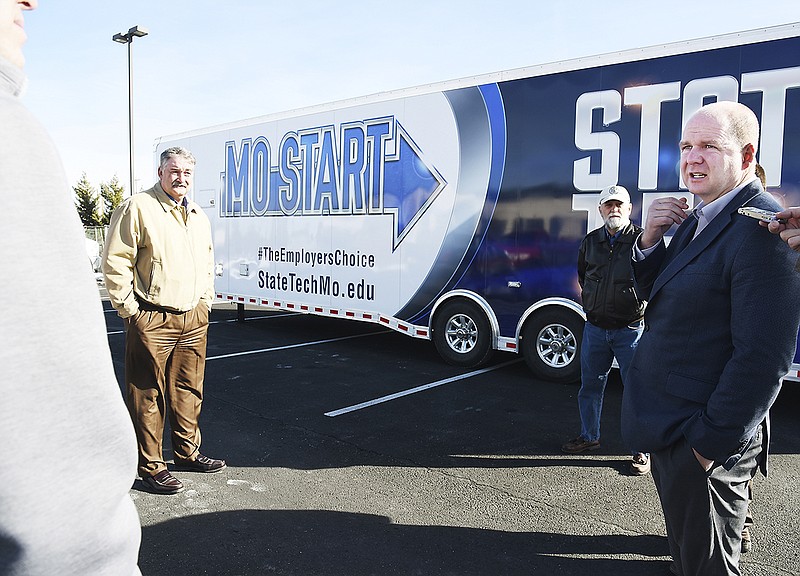LINN, Mo. - Thanks to a four-year, $2.7 million federal grant, State Technical College of Missouri soon will be taking some of its classes to prison.
"We were given that money to train, or re-train, unemployed, under-employed and low-skilled individuals to go back to work, or to expand their career paths," Nancy Wiley, State Tech's federal grant manager, explained Friday.
"We're partnering with the Department of Corrections and the Central Workforce Investment Board - so we're literally being able to teach our classes inside the prison walls.
"Which is really a pretty big deal."
The training will reach the inmates - or "justice-involved individuals," as Wiley calls them - through a large trailer that State Tech ordered.
It just arrived Thursday, so it has not been outfitted yet with the equipment and training modules that will be used first at the state's Boonville and Vandalia Correctional Centers and then possibly Tipton and Algoa, she said.
On Friday, school officials showed off the new trailer to regents, reporters and others.
The grant is called MoSTART, Missouri Strategic Training and Re-Tooling and it helps bring training in computers, introduction to electricity, heating-and-cooling technology and others to the prisons.
The goal is to help inmates learn skills that can be used to get jobs once the inmates have left prison, including bringing them up-to-date on modern technology.
"Think what your cellphone was like (only) 10 years ago," Wiley noted. "In my humble opinion, it's imperative" to teach those modern tech skills.
The eligible inmates also will be taught resume-writing and interviewing skills.
Wiley hopes many of the inmates can do video or online interviews with potential employers even before they leave prison - with the idea that some can have jobs waiting for them when they leave.
Employers are willing to interview the inmates, she said.
"No one is going to commit to hire - and I understand that," Wiley said. "But I truly think, once the ball starts rolling "
The grant, "will pay for 60 days of on-the-job training (and) for transportation for that person, to-and-from their job. And it will pay for child care.
"So, this man or woman is really equipped while they're still incarcerated," she said.
State Tech's motto is "the employers' choice" - the training it provides students produces a workforce employers want to hire and keep.
And, Wiley said, that motto will extend to the training offered to prison inmates under the grant program.
The first 18 months of the grant involved designing the trailer and getting approval from the Corrections Department and others for the programs operations.
In the final 2 years, Wiley said, State Tech will train 325 people, with the hope 90 percent of those will be employed after they leave prison.
One downside, she said, is the grant money is limited and will run out.
"(That) 325 people is a lot to train," she said. "But, we'd like to train 30,000 across Missouri."
She hopes a future grant will help expand the program just as the MoSTART grant is the fourth the school has received to help with in-prison education programs.
"Justice-involved individuals are people who have made a mistake," Wiley said, "and need an opportunity to succeed and be successful in society.
"And this training can do that."

